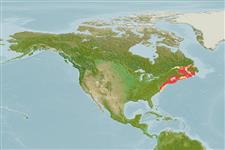Preferred temperature (Ref.
123201): 1.5 - 14.4, mean 7.9 °C (based on 130 cells).
Phylogenetic diversity index (Ref.
82804): PD
50 = 0.5000 [Uniqueness, from 0.5 = low to 2.0 = high].
Bayesian length-weight: a=0.00263 (0.00232 - 0.00298), b=3.23 (3.20 - 3.26), in cm total length, based on LWR estimates for this species (Ref.
93245).
Trophic level (Ref.
69278): 4.4 ±0.5 se; based on diet studies.
устойчивость к внешним воздействиям (Ref.
120179): очень низкий, минимальное время удвоения популяции более 14 лет (tmax=20.8; tm=11-12; Fec assumed to be <100).
Prior r = 0.04, 95% CL = 0.02 - 0.05, Based on 1 full stock assessment.
Fishing Vulnerability (Ref.
59153): High vulnerability (59 of 100).
Nutrients (Ref.
124155): Calcium = 10.8 [2.1, 52.6] mg/100g; Iron = 0.305 [0.081, 0.865] mg/100g; Protein = 17.6 [14.8, 20.3] %; Omega3 = 0.877 [0.282, 3.251] g/100g; Selenium = 10.7 [2.7, 33.9] μg/100g; VitaminA = 13.1 [4.1, 41.9] μg/100g; Zinc = 0.315 [0.151, 0.571] mg/100g (wet weight);
